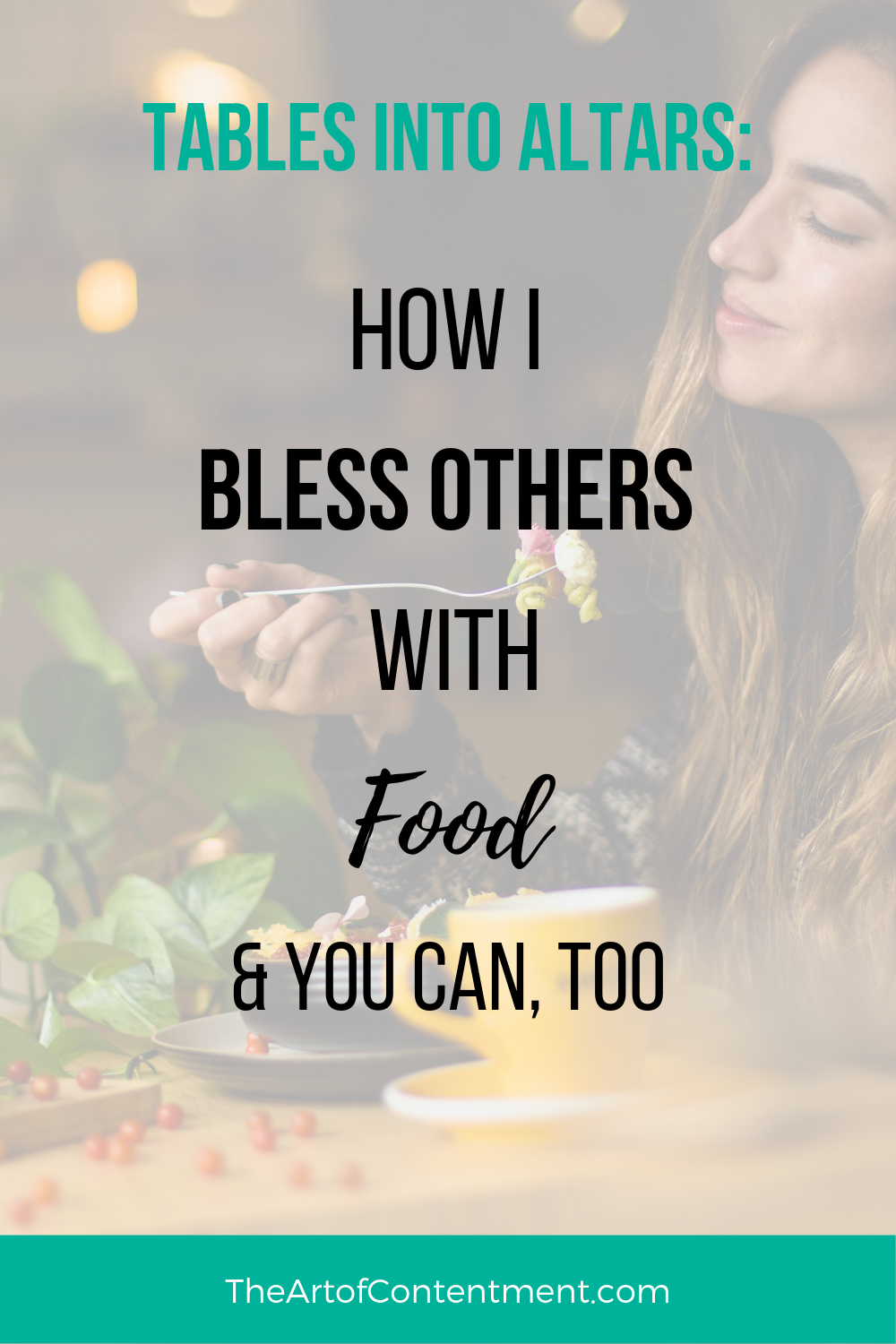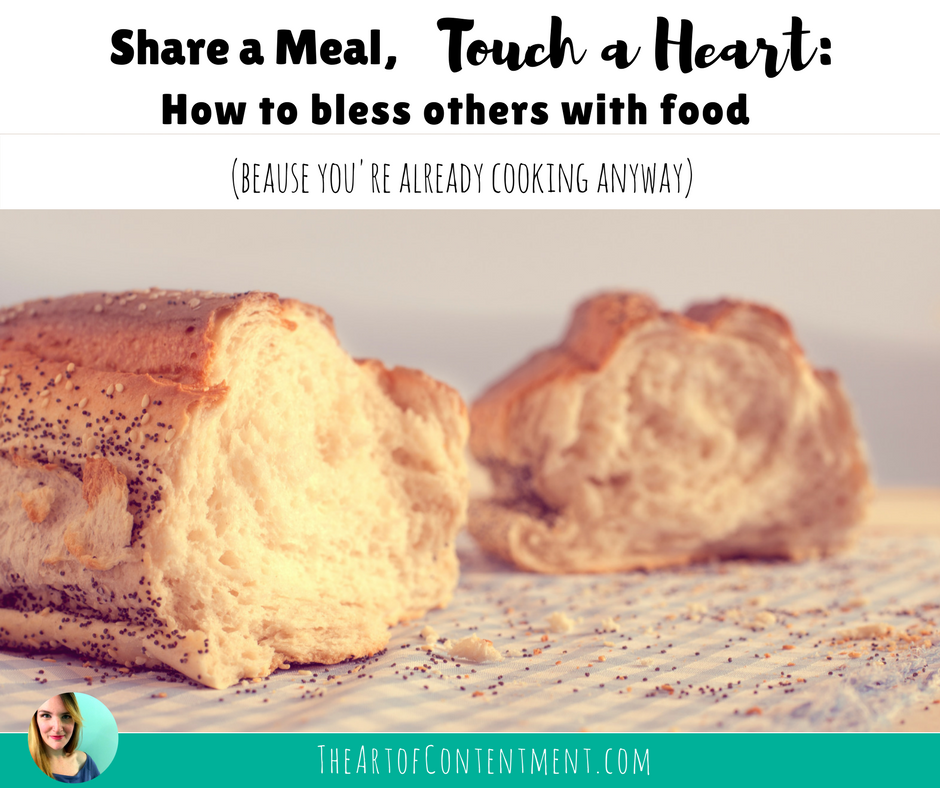 Have you ever sat around the table for hours after dinner, talking about everything and nothing, laughing together as the minutes speed by?
Have you ever sat around the table for hours after dinner, talking about everything and nothing, laughing together as the minutes speed by?
When people peeled away to go to bed, slipped off to wash dishes, or shuffled to cars, their hearts were singing. Fulfilled, content, and joyful. This was community at its best.
At times like this our tables transform into altars. Our dining chairs reform into humble pews, and our laughter becomes prayers.
An altar is a place, either physical or spiritual, where we give ourselves back to God.
In America, we don’t place much emphasis on meals: they can be a fun social occasion or a time to relax, but are meals spiritual? In Near East cultures, however, like the Israelites, saw table fellowship as a spiritual opportunity.
This is still true in Near East cultures today. An opportunity to bless, to welcome, to strengthen friendships, to nurture, and to accept one another. “In the East all aspects of life are perceived as spiritual occasions and when it comes to meals the kitchen table and the altar are inseparable” remarks Dr. Eli Lizorkin-Eyzenberg.
The Bible shows us many occasions when the humble dinner table became a blessed altar:
- In Psalm 23, King David wrote eloquently about how God prepared a table for David in the presence of his enemies. (yes, I realize this is a figurative “table” but you get the idea, right?) The table represents God’s peace and protection over Israel’s king. Soldiers awaiting the start of battle, quiet and intense and nervous, don’t fling a cloth over a camp table, light a candle, and whip out Grandma’s silverware to linger over a steak dinner. No, soldiers preparing for battle eat quick, fast, and in a hurry. Imagine the trust one must have in the Lord to sit back and eat in peace while the enemy camps nearby, close enough to smell the camp’s smoke.
- Jesus ate openly with “sinners” many times. Jesus’s public fellowship with society’s rejects showed friendship and acceptance for His repentant followers. Ragamuffins who were snubbed by the goody-two-shoes of society were welcomed by the King.
- Peter entered the home of Cornelius, a godly Roman centurion, at the urging of the Holy Spirit. Jews usually didn’t interact with gentiles, much less eat with them, because the Jews might become ritually unclean. Fellowshipping at the table with a gentile was a public sign of how Jesus had changed the face of faith: all were welcome.
A little shared food can make a big statement.
One of my personal goals this year (I loathe to call it a New Year’s resolution) is to be more generous to others by sharing myself: my time, my effort, and my attention. It takes work for me not to be selfish.
One way I share myself is by offering my attention to my family over meals. Yes, my dad may be tired of Saturday waffles and my kids may shrink away from the carrots, but it’s love on a plate.
But food isn’t really the point, only feeble symbols offered in jars of clay. We take our ordinary, common, everyday meals and offer them back to God, who makes them extraordinary. Food into blessing.
Our tables become altars when we offer the sacrifice of our attention and devotion. When we sit on our chairs, we face each other, physically and spiritually. Across this space we pass the cords of spiritual bonds – and the peas. We bind ourselves together so that the pressures of life can’t easily break us.
- Food costs us money. When we share a meal, we say “You are valuable.”
- Food preparation takes time. We say, “You are worth it.”
- Food (usually) delights the senses. We say, “Enjoy this with me.”
- Food requires time to savor. We say, “Linger here with me.”
- Food represents provision. We say, “Let me meet your needs.”
For the people in biblical times, food was a blessing and a way to bless someone else. Let’s explore a few practical ways to make our tables into altars to God and vessels to serve others:
Start with your own family. Home is your children’s first church. It’s where they learn most about the ways of the Lord (by watching you). So think of the table as your family’s altar.
Maybe your family has dinner together every night. If so, then you’re already blessing the ones you love. But maybe most dinners are like this: fast food from a drive-through window on Monday, then a quick raid in the kitchen cabinets on Wednesday and Thursday as everyone eats in front of the tv or in their bedrooms, and a sandwich in your purse as you haul your son to baseball practice on Friday.
Many nights, my six-year-old son with autism sits along the kitchen island and hops down a dozen times to investigate the buttons on the dishwasher. Meanwhile, my toddler ignores me so he can interview grandpa about grandpa’s day. Look familiar?
Sometimes a speedy dinner makes way for equally important events.
But on most evenings, plan to eat together at an actual table. Consider ways to adjust your schedule so you can have dinner with your family most nights of the week.
This may require sacrifice. Drop an afterschool activity for your kids, say no to working late, run your errands on Saturday morning, or trim back on volunteering at church. Sometimes even good things need to step aside so great things can take their place.
Your dinner time is an opportunity to share joys, accomplishments, and stories of the day. And it’s a holy moment to comfort one another, wipe away tears, encourage, and sense spiritual needs in your family.
As you bless your loved ones with nourishing food, feed their spirits with the special attention they crave.
I started asking my family a few questions this week and maybe you can try some version of this:
- What was the best part of your day (or week)?
- What was the toughest part?
- What can we pray about this week?
(I read these questions somewhere online, but I can’t remember where. Thank you to whoever originally suggested these ideas.)
Your table doesn’t have to be a table. These “traveling altars” take any form you can imagine: Baked cookies for a child who had a long day at school, a blueberry muffin for a co-worker, a candy bar with a note slipped in your husband’s lunch. Or maybe it’s a cup of coffee at the café with a friend who needs to talk. For me, it’s often listening longer to a fellow mom’s story when I’m overwrought about something and want to talk, too.
My aunt started a women’s Bible study, which begins with a potluck dinner for moms and kids. We shove tables together until everyone fits. Many times we’ve talked and shared our victories and miseries for so long that we don’t get to the night’s lesson. We’ve prayed for husbands to be offered better-paying jobs, for God to provide a way to afford homeschooling, for marriages on the brink of broken.
Our jumbled tables became altars.
We cook dinner, grab fast food, throw together breakfast or whip up a snack every day. Isn’t it wonderful that the small things in life can be used to glorify God?
The small things in life are life.
God can take our tacos and make a table in the presence of enemies for a man who is facing battles at work. God can serve our salmon to a teen who feels rejected by her peers but is learning how much she is welcomed by her Father. And God can offer our omelets to the down-and-out wife who is the outsider in her marriage but loved by her Provider.
A line in one of the singer Jewel’s songs is “we are God’s hands…” How blessed we are that we can use these weak hands to offer strength to the weary, encouragement to the sad, and a “way to go!” for those who walk through life with us.
Maybe I’m overwriting here. Go bake some cookies!



